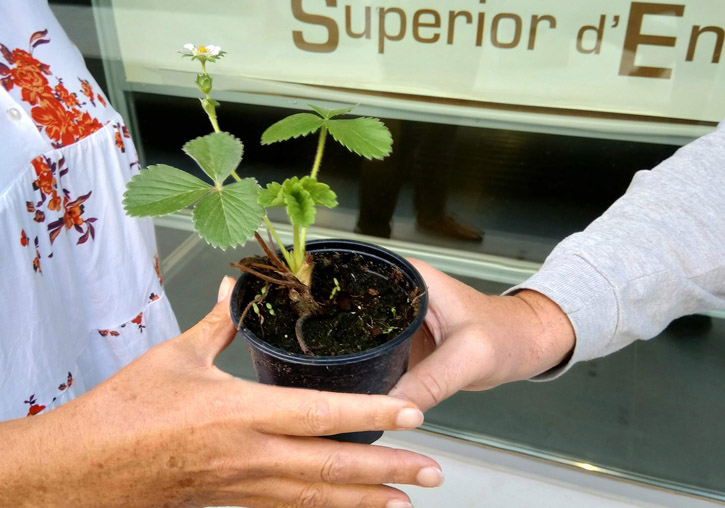University students participate in a study to measure air quality with strawberry plants
- Scientific Culture and Innovation Unit
- October 20th, 2020

The School of Engineering (ETSE-UV) of the University of Valencia participates in a study developed throughout Spain to measure the quality and pollution of the air through strawberry plants. Around 300 students of different university degrees, including students from the Data Science Degree at the UV, are in charge of conserving the plants, which will function for three months as environmental stations and through them the concentration of heavy metals in the air will be known.
This study, named ‘Vigilantes del aire’ (‘Air vigilance’), is led from Zaragoza through the Ibercivis foundation and the Pyrenean Institute of Ecology of the CSIC. In it, 17 groups – regional ambassadors – from points from all over Spain participate. The ultimate goal of the project is to develop an air quality map from the data provided by the strawberry leaves. The Valencian branch of the project will be presented on October 29 at 7:00 p.m. at the Municipal Institute of Culture of Meliana, within the framework of the Science and Environment Week (Setciències 2020).
In this edition of ‘Vigilantes del aire’, around 5,000 plants have been distributed, 330 of them in Valencia, distributed mainly to university students. Other educational centres and cultural and fallas associations also participate. In this way, the project is one more example of what is known as citizen science, since it is a study that requires the participation of people who do not necessarily have specific prior knowledge. This volunteering not only contributes to research, but they will be able to learn new scientific-technical skills.
Other participatory projects use appropriate technologies or stations to collect this data, on the other hand, ‘Vigilantes del aire’ is committed to filling the city with plants to contribute to environmental sustainability. And why precisely strawberries? These plants are easy to grow and have rough leaves to which pollutant particles suspended in the air get attached. Therefore, through its leaves you can detect harmful substances in the air you breathe.
These plants were given to the participants at the beginning of October together with a technical sheet that lists the care that the plant needs. The volunteers will have to take care of the strawberry maintenance and control its growth. On December 23, they will have to send two of their leaves together with a questionnaire that will collect the evolution of the plant during these three months (location, sun exposure, height, appearance, etc.). This questionnaire has been designed by the same Data Science student at ETSE-UV.
Thus, this project unites the scientific component with the possibility that the students participate in the entire research process: it is the students who design the questions and the hypothesis; They collect the data and, finally, analyse them from the questionnaire they have developed. In addition, the 330 plants are distributed both in various neighbourhoods in Valencia and in other municipalities in neighbouring regions. This will allow a more complete map of air quality in the territory to be drawn up.
The ‘Vigilantes del aire’ initiative is funded by the Spanish Federation for Science and Technology (FECYT), and defends the value of data transparency. For this reason, once the results of the study are known, they will be published openly so that the public is aware of the quality of the air they breathe. All this information will be available on the https://vigilantesdelaire.ibercivis.es/ website.
















